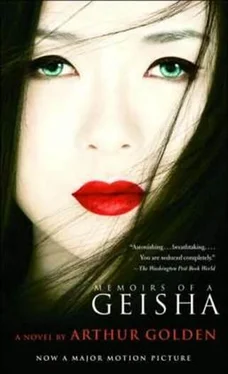Shojiro didn’t have an easy time of it, but soon he succeeded in getting Hatsumomo to her feet. Then with the crowd behind him, he took her in his arms and bent her back. But after only an instant, he jerked upright again with a shout, and grabbed his lip. Hatsumomo had bitten him; not enough to make him bleed, but certainly enough to give him a shock. She was standing with her eyes squinted in anger and her teeth exposed; and then she drew back her hand and slapped him. I think her aim must have been bad from all the sake she’d drunk, because she hit the side of his head rather than his face.
“What happened?” Tachibana asked me. His words were as clear in the quiet of the room as if someone had rung a bell. I didn’t answer, but when he heard Shojiro’s whimper and the heavy breathing of Hatsumomo, I’m sure he understood.
“Hatsumomo-san, please,” said Mameha, speaking in a voice so calm it sounded completely out of place, “as a favor to me… do try to calm down.”
I don’t know if Mameha’s words had the precise effect she was hoping for, or whether Hatsumomo’s mind had already shattered. But Hatsumomo threw herself at Shojiro and began hitting him everywhere. I do think that in a way she went crazy. It wasn’t just that her mind seemed to have fractured; the moment itself seemed disconnected from everything else. The theater director got up from the table and rushed over to restrain her. Somehow in the middle of all this, Mameha slipped out and returned a moment later with the mistress of the teahouse. By that time the theater director was holding Hatsumomo from behind. I thought the crisis was over, but then Shojiro shouted at Hatsumomo so loudly, we heard it echo off the buildings across the river in Gion.
“You monster!” he screamed. “You’ve bitten me!”
I don’t know what any of us would have done without the calm thinking of the mistress. She spoke to Shojiro in a soothing voice, while at the same time giving the theater director a signal to take Hatsumomo away. As I later learned, he didn’t just take her inside the teahouse; he took her downstairs to the front and shoved her out onto the street.
* * *
Hatsumomo didn’t return to the okiya at all that night. When she did come back the following day, she smelled as if she had been sick to her stomach, and her hair was in disarray. She was summoned at once to Mother’s room and spent a long while there.
A few days afterward, Hatsumomo left the okiya, wearing a simple cotton robe Mother had given her, and with her hair as I’d never seen it, hanging in a mass around her shoulders. She carried a bag containing her belongings and jewelry, and didn’t say good-bye to any of us, but just walked out to the street. She didn’t leave voluntarily; Mother had thrown her out. And in fact, Mameha believed Mother had probably been trying to get rid of Hatsumomo for years. Whether or not this is true, I’m sure Mother was pleased at having fewer mouths to feed, since Hatsumomo was no longer earning what she once had, and food had never been more difficult to come by.
If Hatsumomo hadn’t been renowned for her wickedness, some other okiya might have wanted her even after what she’d done to Shojiro. But she was like a teakettle that even on a good day might still scald the hand of anyone who used it. Everyone in Gion understood this about her.
I don’t know for sure what ever became of Hatsumomo. A few years after the war, I heard she was making a living as a prostitute in the Miyagawa-cho district. She couldn’t have been there long, because on the night I heard it, a man at the same party swore that if Hatsumomo was a prostitute, he would find her and give her some business of his own. He did go looking for her, but she was nowhere to be found. Over the years, she probably succeeded in drinking herself to death. She certainly wouldn’t have been the first geisha to do it.
In just the way that a man can grow accustomed to a bad leg, we’d all grown accustomed to having Hatsumomo in our okiya. I don’t think we quite understood all the ways her presence had afflicted us until long after she’d left, when things that we hadn’t realized were ailing slowly began to heal. Even when Hatsumomo had been doing nothing more than sleeping in her room, the maids had known she was there, and that during the course of the day she would abuse them. They’d lived with the kind of tension you feel if you walk across a frozen pond whose ice might break at any moment. And as for Pumpkin, I think she’d grown to be dependent on her older sister and felt strangely lost without her.
I’d already become the okiya’s principal asset, but even I took some time to weed out all the peculiar habits that had taken root because of Hatsumomo. Every time a man looked at me strangely, I found myself wondering if he’d heard something unkind about me from her, even long after she was gone. Whenever I climbed the stairs to the second floor of the okiya, I still kept my eyes lowered for fear that Hatsumomo would be waiting there on the landing, eager for someone to abuse. I can’t tell you how many times I reached that last step and looked up suddenly with the realization that there was no Hatsumomo, and there never would be again. I knew she was gone, and yet the very emptiness of the hall seemed to suggest something of her presence. Even now, as an older woman, I sometimes lift the brocade cover on the mirror of my makeup stand, and have the briefest flicker of a thought that I may find her there in the glass, smirking at me.

In Japan we refer to the years from the Depression through World War II as kurotani -the valley of darkness, when so many people lived like children whose heads had slipped beneath the waves. As is often the case, those of us in Gion didn’t suffer quite as badly as others. While most Japanese lived in the dark valley all through the 1930s, for example, in Gion we were still warmed by a bit of sun. And I’m sure I don’t need to tell you why; women who are mistresses of cabinet ministers and naval commanders are the recipients of enormous good fortune, and they pass that good fortune along to others. You might say Gion was like a pond high up on a mountaintop, fed by streams of rich springwater. More water poured in at some spots than others, but it raised the pond as a whole.
Because of General Tottori, our okiya was one of the spots where the rich springwater came pouring in. Things grew worse and worse around us during the course of several years; and yet long after the rationing of goods had begun, we continued to receive regular supplies of foodstuffs, tea, linens, and even some luxuries like cosmetics and chocolate. We might have kept these things to ourselves and lived behind closed doors, but Gion isn’t that sort of place. Mother passed much of it along and considered it well spent, not because she was a generous woman, of course, but because we were all like spiders crowded together on the same web. From time to time people came asking for help, and we were pleased to give it when we could. At some point in the fall of 1941, for example, the military police found a maid with a box containing probably ten times more ration coupons than her okiya was supposed to have. Her mistress sent her to us for safekeeping until arrangements could be made to take her to the countryside-because of course, every okiya in Gion hoarded coupons; the better the okiya, the more it usually had. The maid was sent to us rather than to someone else because General Tottori had instructed the military police to leave us alone. So you see, even within that mountaintop pond that was Gion, we were the fish swimming in the very warmest water of all.
Читать дальше













